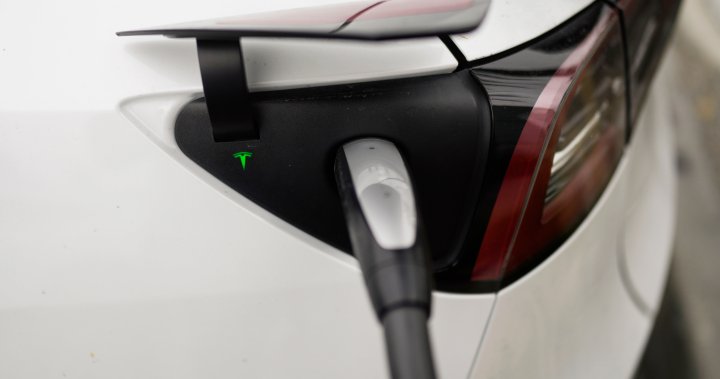Resistance Mounts: Car Dealerships Push Back On EV Mandate

Table of Contents
Financial Concerns and Investment Hurdles
The transition to an EV-centric market presents significant financial challenges for car dealerships, particularly smaller businesses. The high upfront costs and uncertainties surrounding return on investment are major obstacles.
High Upfront Costs of EV Infrastructure
Dealerships need significant investment to adapt to the EV market. This includes:
- Charging Station Installation: Installing a network of fast and reliable charging stations requires substantial capital expenditure. The cost varies depending on the number of chargers, their power output, and the necessary grid upgrades.
- Specialized Tools and Equipment: Servicing EVs requires specialized tools and diagnostic equipment, which are often expensive and require specialized training to use.
- Employee Training: Technicians need extensive training to safely and effectively service high-voltage battery systems and other EV-specific components. This training is not only costly but also time-consuming.
- Inventory Management Changes: Dealerships need to adapt their inventory management systems to accommodate the different lead times, storage needs, and potential obsolescence of EVs compared to gasoline-powered vehicles.
The return on investment for these upgrades is uncertain, given the fluctuating consumer demand for EVs and the potential for unsold inventory. Smaller dealerships, with limited financial resources, face disproportionate burdens, potentially forcing some out of business if they cannot adapt quickly enough to meet these EV mandates. A lack of sufficient government support for infrastructure upgrades further exacerbates these challenges.
Inventory Management Challenges with EVs
Managing EV inventory presents unique challenges:
- Longer Lead Times: EVs often have significantly longer lead times than gasoline-powered vehicles, making it harder to meet fluctuating consumer demand.
- Demand Prediction: Accurately predicting consumer demand for specific EV models is difficult due to evolving technology and consumer preferences. Overstocking risks financial losses, while understocking can lead to lost sales.
- Specialized Storage: EV batteries require specific storage and handling procedures to maintain optimal performance and safety, adding to the cost and complexity of inventory management. This includes temperature control and protection from damage.
The combination of these factors makes inventory management for EVs far more complex and risky than for traditional vehicles, adding another layer of financial pressure on dealerships grappling with electric vehicle mandates.
Consumer Demand and Market Readiness
While the demand for EVs is growing, several factors hinder widespread adoption, contributing to the resistance against mandates.
Limited Consumer Awareness and Understanding of EVs
Many consumers remain hesitant about EVs due to several concerns:
- Range Anxiety: The fear of running out of battery charge before reaching a charging station is a significant barrier for many potential buyers.
- Charging Time: The time required to fully charge an EV is often longer than filling a gasoline tank, which can be inconvenient for some drivers.
- Cost: The upfront cost of EVs remains higher than comparable gasoline-powered vehicles, although government incentives are attempting to bridge this gap.
- Misconceptions: Many misconceptions persist about EV performance, maintenance requirements, and battery lifespan, hindering consumer confidence.
Addressing these concerns through effective public education campaigns is crucial to increasing consumer acceptance and mitigating the resistance against EV mandates.
Insufficient Charging Infrastructure
The lack of a robust public charging network is a significant hurdle to EV adoption:
- Inadequate Network: Many areas, especially rural communities, lack sufficient public charging stations, contributing to range anxiety.
- Uneven Distribution: Charging stations are often concentrated in urban areas, leaving many drivers in rural regions underserved.
- Charging Speed and Reliability: Concerns remain about the speed and reliability of public charging stations, with some experiencing downtime or inconsistent charging speeds.
The expansion of the charging infrastructure is essential for overcoming consumer hesitation and fostering a wider acceptance of electric vehicles, and for lessening the impact of electric vehicle mandates on dealerships and the public.
Challenges in Servicing and Repairing EVs
Servicing and repairing EVs pose unique challenges that dealerships must overcome:
Specialized Training and Tools Required
Working on high-voltage systems requires specific skills and equipment:
- Specialized Training: Mechanics need specialized training to work safely with high-voltage battery systems, electric motors, and other EV components.
- Costly Tools: Investing in the specialized tools and diagnostic equipment necessary for EV repair is expensive.
- Technician Shortage: There is a current shortage of qualified EV technicians, making it difficult for dealerships to find and retain skilled personnel.
These factors contribute to increased labor costs and potential delays in servicing EVs, adding another layer of complexity for dealerships dealing with EV mandates.
Complexity of EV Repair and Potential Safety Risks
Repairing EVs presents several challenges:
- High-Voltage Safety Risks: High-voltage systems pose significant safety risks to untrained personnel. Dealerships need to invest in safety training and equipment to mitigate these risks.
- Expensive and Time-Consuming Repairs: Repairing EV batteries can be extremely expensive and time-consuming, adding to the cost of ownership and potential delays in service.
- Parts Availability: The availability of replacement parts for EVs can sometimes be limited, leading to longer repair times and additional costs.
These challenges highlight the need for increased investment in training and infrastructure to support the safe and efficient repair of EVs.
Conclusion
The resistance to electric vehicle mandates from car dealerships is multifaceted and deeply rooted in legitimate concerns about financial viability, consumer readiness, and the practical challenges of EV servicing. Addressing these concerns requires a collaborative effort involving government, manufacturers, and dealerships themselves. Increased investment in charging infrastructure, consumer education, and support for dealership transitions are crucial for a smooth and successful shift towards electric vehicle adoption. Ignoring this resistance could hinder the widespread adoption of EVs and delay the transition to a greener future. Therefore, finding solutions that address the concerns surrounding electric vehicle mandates is vital for a successful transition to a sustainable transportation system. Open dialogue and collaborative efforts are key to overcoming the resistance and achieving widespread acceptance of electric vehicles. Let's find ways to mitigate the challenges associated with electric vehicle mandates to accelerate the adoption of sustainable transportation solutions.

Featured Posts
-
 Ukraine Conflict North Korea Admits Sending Troops To Russia
Apr 29, 2025
Ukraine Conflict North Korea Admits Sending Troops To Russia
Apr 29, 2025 -
 Vatican Defrauded London Property Deal Ruled Fraudulent By British Court
Apr 29, 2025
Vatican Defrauded London Property Deal Ruled Fraudulent By British Court
Apr 29, 2025 -
 Higher Earning Potential Minnesota Immigrant Job Market Trends Revealed
Apr 29, 2025
Higher Earning Potential Minnesota Immigrant Job Market Trends Revealed
Apr 29, 2025 -
 Macario Martinezs Overnight Success A Story Of Perseverance And Recognition
Apr 29, 2025
Macario Martinezs Overnight Success A Story Of Perseverance And Recognition
Apr 29, 2025 -
 Ambanis Reliance Strong Earnings Signal Positive Outlook For Indian Market
Apr 29, 2025
Ambanis Reliance Strong Earnings Signal Positive Outlook For Indian Market
Apr 29, 2025
Latest Posts
-
 Missing Person Midland Athlete Vanishes In Las Vegas
Apr 29, 2025
Missing Person Midland Athlete Vanishes In Las Vegas
Apr 29, 2025 -
 Papal Conclave Debate Over Convicted Cardinals Voting Rights
Apr 29, 2025
Papal Conclave Debate Over Convicted Cardinals Voting Rights
Apr 29, 2025 -
 Wrestle Mania Missing Brit Paralympian Found After Four Day Search
Apr 29, 2025
Wrestle Mania Missing Brit Paralympian Found After Four Day Search
Apr 29, 2025 -
 Brit Paralympian Missing At Wrestle Mania Found Safe
Apr 29, 2025
Brit Paralympian Missing At Wrestle Mania Found Safe
Apr 29, 2025 -
 Papal Conclave Debate Over Convicted Cardinals Voting Eligibility
Apr 29, 2025
Papal Conclave Debate Over Convicted Cardinals Voting Eligibility
Apr 29, 2025
